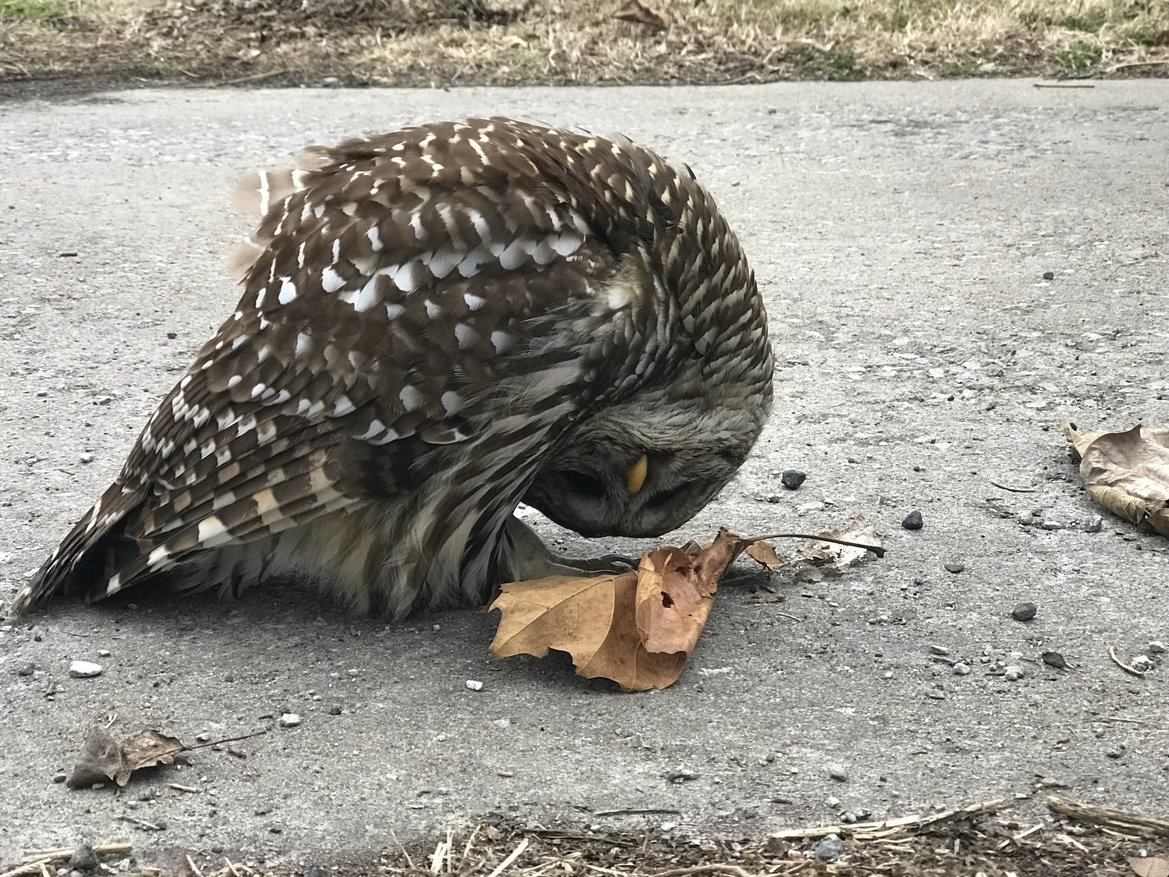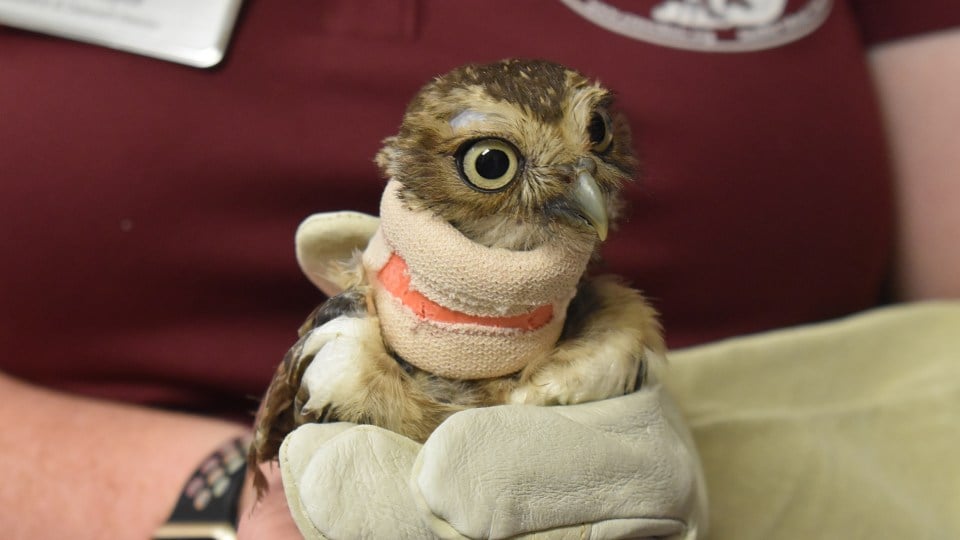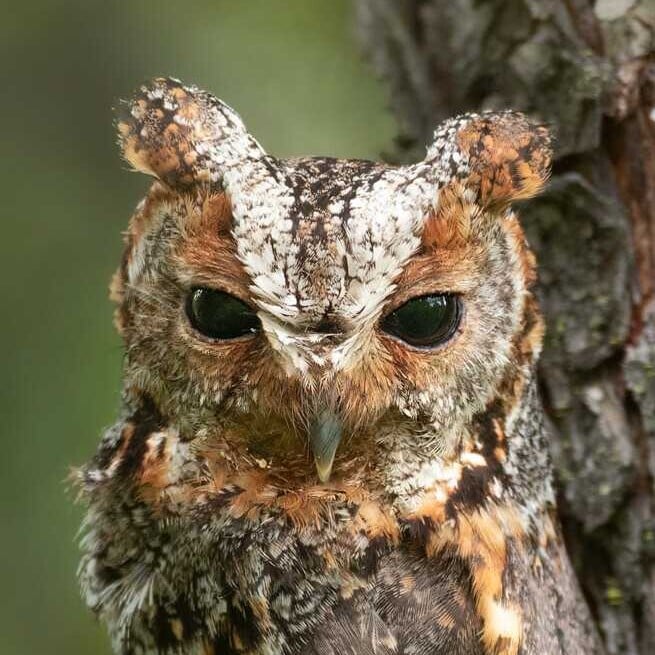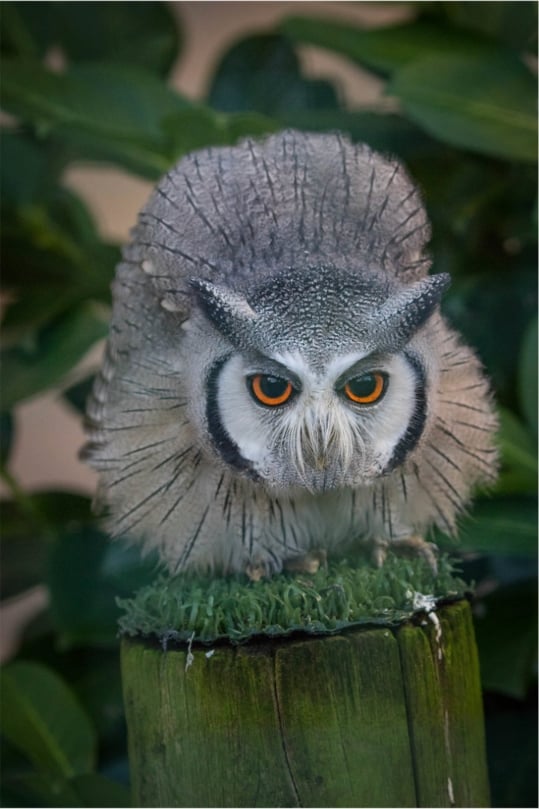Owls are famous for their neck twisting abilities. Backwards, upside down, it seems like they can go in near any direction with ease. Most times, this is advantageous for them, but sometimes it can be the painful symptom of an underlying problem.

Torticollis is Latin for “twisted neck”, and it is also called wry neck, crook neck, or stargazing. It is not a disease in itself, as it is always caused by something else. There are many conditions that can cause this condition in birds of all kinds. Vitamin deficiency, neurological conditions, head or eye trauma, heavy metal or chemical poisoning, or birth defects are all possible reasons a bird may develop this condition. Other animals, including humans, can also develop torticollis. I saw this NIH article that says around 90% of people will have at least one case of it in their lives!
Torticollis is the result of muscle spasms in the neck. It can be painful and make it difficult to move the head. Prolonged cases can cause the muscles to develop unevenly, making itself worse. Depending on the affected nerves and muscles, the head can end up in just about any position. After time, the head can no longer be held in its correct position, making it difficult or impossible to eat or drink, to fly, or to perch. The damage from the loss of equilibrium or being unable to eat/drink can make this scary looking but rather benign condition a fatal one in untreated animals.
Another sign of torticollis is called twirling. This is due to the loss or equilibrium and is what makes it difficult for the bird to perch, and they can’t keep themselves upright. Here is a video of a finch exhibiting twirling behavior.
Thankfully, it is not a contagious condition as it is neurological, and if the underlying cause can be treated, it can be fixed. Here is a Burrow Owl in a neck brace, to try and keep the head at a neutral position. This can aid the bird in eating and stabilizing itself easier.

Birds with this condition should be quarantined to minimize anything that could aggravate the condition further, such as aggression from other birds or injury from the environment and additional stress. If it is disease related, treatment with antibiotics or antifungals can be administered. Calcium deficiency can be a cause that is easily treatable with supplements. Vitamin E and selenium deficiencies can also be causes. Anti-inflammatories can reduce swelling from skull injury. If the bird is poisoned, that must be remedied as soon as possible. As you can see, knowing the root cause is mandatory in helping the bird.
Muscles can also be massaged, and the head and neck can be manipulated to try to relax the tension and reduce the pain. Here is a video of someone doing that to one of their chickens.
It seems like a condition with a long recovery time, especially in more severe cases, but with careful and proper treatment, many birds are able to recover as long as the underlying cause is treatable.
One time I had this severe pain in my neck, and I went to the doctor to make sure it wasn’t serious. He listens to me, examines my neck, presses on it and makes me turn my head. Then in a serious voice he says: “You have Torticollis!”
I was like: “Uh… what should I do about it?”
Doc said “There’s nothing to be done” and left.
I was like: FML it’s probably some kind of neck cancer! I’ma die! This was back in the days of flip-phones, so it wasn’t til I got home to a computer that I could look up that it just meant: A pain in the neck.
It would have been kind of him to take the extra few seconds to say something like that! Sounds like you had to deal with 2 pains in the neck that day! 😅
I saw this NIH article that says around 90% of people will have at least one case of it in their lives!
Is it so surprising ? They are not as commun as a cold but probably as common as otitis. You can get easily a small one by not covering enough you neck and shoulder in winter or standing in the AC air flow in summer.
The french word is also torticoli (singular), torticolis (plural with a silent s).
I don’t know if I’ve ever thought about it as a medical condition though, just something that happened from sleeping in a strange position or making a weird movement. Plus if it gets bad, we can go to a doctor, unlike the animals, before it gets really bad like in the photos.
I never heard the proper name (otitis) before so I had to look that one up, so now I got to learn 2 words today! It is a middle ear infection, and that isn’t any fun either.
otitis
I got the name from Google translate. In french we say “otite”.
Your word is better. ☺️



